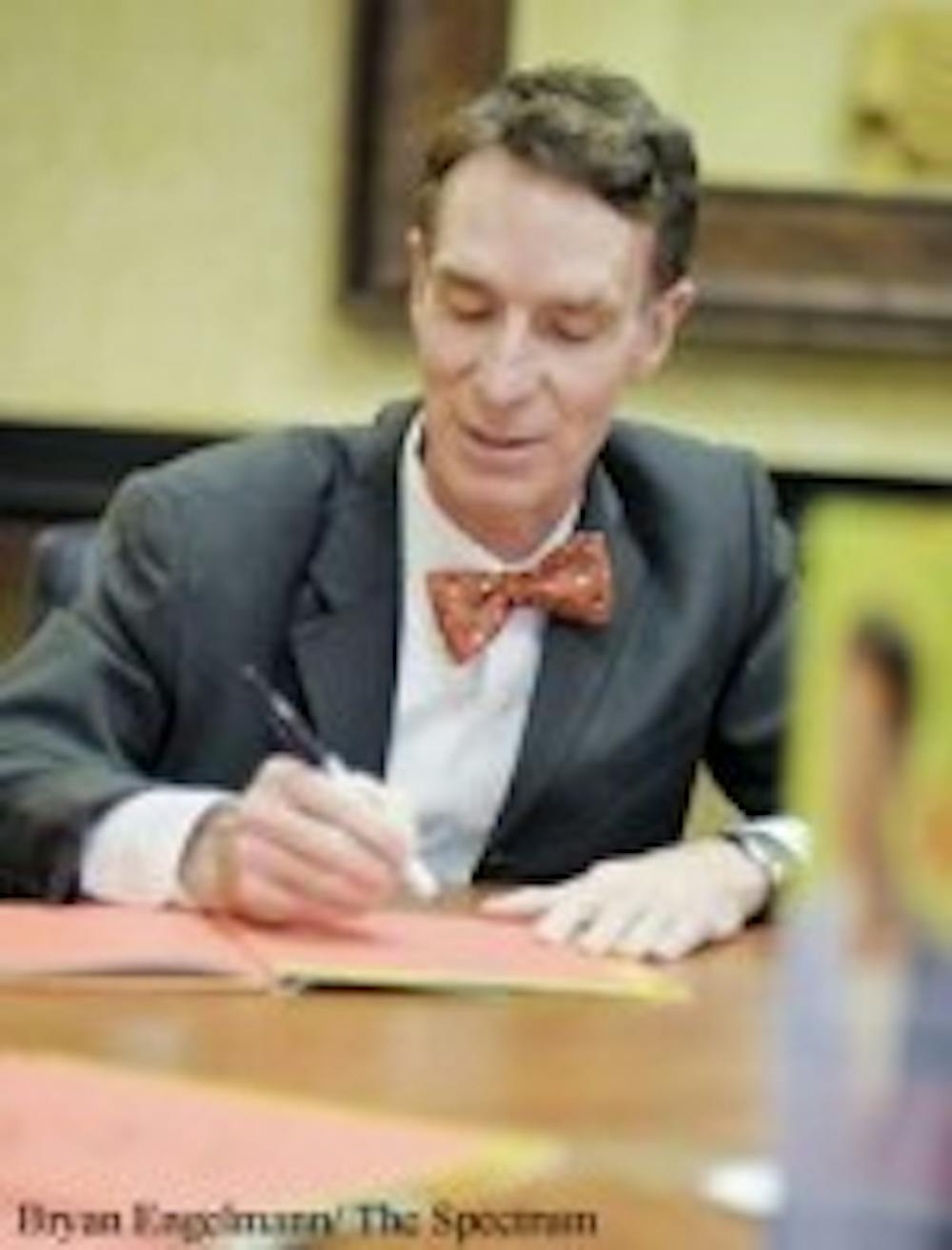Did you know that... one day on Venus takes 243 Earth days, or that a baby whale drinks 400 liters of its mother's milk each day, or that rockets get their momentum from their fuel? Here are some more facts you may or may not have known about Bill Nye, our favorite science guy, in an exclusive interview.
The Spectrum: How do you feel being looked up to by people now as you looked up to Don Herbert [host of popular TV show Mr. Wizard of the 1950s] in the past?
Nye: It is remarkable and I don't think I get it. People come up to me all the time and they tell me, "The reason I went into medicine," or, "The reason I went into oceanography," or whatever the heck it is, or "did well in science in high school was because I watched your show." Although I would have claimed that's exactly what I intended to do, it's still striking. It's a big responsibility. It's very flattering. I enjoy doing the talk, but my favorite part is the Q&A.
S: What is your favorite part about doing television shows?
N: When I get the crew to laugh - that's not entirely accurate - when the demonstration works and when one feels that one has set out to do. I am the guy on camera and the head writer; a lot of what you saw was something I believed in and wanted to show people.
S: You talk about a lot of topics on your TV shows-how did you become an expert in so many things?
N: I don't think I'm an expert in so many things. What we're getting across is fundamental science, so when you research it and you're scientifically literate going in, then you know what's good and what's not so good. We had a lot of discipline in what to leave out. That made the messages that you did get across much more memorable and, if you will, that much more convincing.
S: The topics featured in The Eyes of Nye are more in-depth; how did you decide on featuring them?
N: We looked at what we wanted to talk about. Antibiotic drug resistance is a very serious problem. To me, nuclear waste is potentially a serious problem; no one is really doing anything about it. The show on addiction - this is for example. I was skeptical of the show on addiction until we started doing it. It was fantastic. Addiction sucks, but it's fascinating - it changing your brain. I never stopped to think about it - pun intended.
S: What is your take on the current state the Earth is in and how people are going about taking care of the environment?
N: As I like to say, if you like to worry about things, if you're a worrying person, you must be having the time of your life. This couldn't get any better for you - [we've] got a mortgage crisis, a worldwide economic crisis, we have people shooting each other, literally blowing themselves up in the name of what they believe in. That's all fine, you can worry about that. But if you really want to worry about something, you should worry about climate change.
Climate change is worrisome. When I was young, the first Earth Day in 1970, everyone was concerned about pollution, and quite normally so. Pollution is still an enormous problem. Sea trash is bad news, but pollution comes to be not as important and not as deadly as climate change seems to be.
S: If there was one thing you could change about what people are doing, what would that be?
N: Just taking it a lot more seriously. Take climate change much more seriously.
S: Do you think the media does a good job presenting the situation?
N: They're alright. There's a fundamental problem. There is a tradition right now, especially in television media, to present both sides. I understand as well as the next guy, if not better, that television has to be entertaining. With regard to climate change, they want to present both sides. You'll have a concerned scientist, or someone like Jim Hansen, be there and they'll have someone who will - all due respect - [be] way out of the mainstream... a wacko. And he is presented as having equal weight or scientific integrity. This tradition of television has led to this crazy, completely out of touch with the rest of the world, minority that we have in the United States, skeptical of climate change.
S: Do you think schools and universities are doing a good job of teaching students?
N: The universities are doing very well. The problem we have in society is with elementary science. In the No Child Left Behind [Act of 2001], generally in very few places do they have any science requirements at all for people before they're in seventh grade... you have to get excited about science, or anything, long before seventh grade. So, we have a fundamental oversight.
S: Did you have a favorite teacher?
N: Let me start by asking you how many memorable teachers you had. No one says 7... everyone always says two, three, or one; never seven. So, I have my seventh grade teacher Mr. Flowers, [who] was fantastic, and Mr. Lang for physics.
S: What's the overall message for UB tonight?
N: Change the world.





